Everybody and their uncle has a 2009 Best Teen Books list right now, and occasionally there’s a list for the decade. Which makes it our turn, right? But with the possible exception of Alissa, I’m guessing none of us limited our reading to only things published in 2009, so instead I’ll ask: what were your favorite reads this year, regardless of when they were published?
Mine, in no particular order:
• Paper Towns, John Green
• Tender Morsels, Margo Lanagan
• When You Reach Me, Rebecca Stead (I smell Newbery on this one)
• Catching Fire, Suzanne Collins
• Jellicoe Road, Melina Marchetta
• Wintergirls, Laurie Halse Anderson
A second question: what books were you most looking forward to in 2009, and did they meet your expectations? Catching Fire was everything I wanted and more, but I’ve been working on Scott Westerfeld’s Leviathan for two weeks and I’m barely 100 pages in—it reads so much younger than I’d expected it to, and the world setting he’s created doesn’t feel as true as the world of Uglies, or even his Midnighters series. The characters aren't grabbing me and the plot (so far) isn't radically original.
So: what were your favorites this year? What disappointed? What are you really really really excited for for 2010?
Tuesday, December 15, 2009
Tuesday, November 24, 2009
Holy Cliffhanger Batwoman!
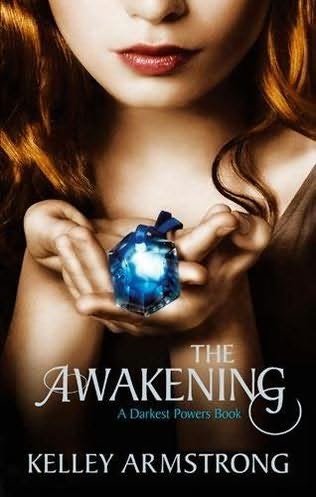

So I'm listening to The Summoning on CD and I feel yet another cliffhanger coming on. I have to say that I like this series better than I thought I would, but I really feel like The Awakening wasn't a complete book. The author didn't even feign a resolution to the story; it went straight to groan inducing cliffhanger. I understand that the publisher wanted to make sure kids read the next installment, but shouldn't all books have resolution even if they're part of a series?! In my opinion they're just two volumes of the same book... though the second is better than the first so far. :)
PS The covers are lame!
Monday, November 23, 2009
Good books, bad audio
I'm in the final chapters of listening to Carrie Ryan's The Forest of Hands and Teeth. I started it maybe a week or so ago, listening in the car on the way to and from work, and at first I wasn't sure I was going to get into it. Eventually the plot won me over, but it took some doing, because the audio version of this? Ugh.
The narrator, Vane Millon, has a somewhat choppy way of speaking, and so her lines. Pause every few words. For no reason. It's like she’s been taking diction lessons from William Shatner. (Those who have heard me speak know that I have similar problems, putting long pauses in my sentences, but then I don't make a living recording audiobooks, so.) But as the plot moved forward and Mary and her friends struggle to survive amidst hordes of the unconsecrated, I forgave this flaw.
The more egregious flaw, though, is that she never stops sounding like she's reading me a book. I've run into this with other audio recordings from time to time, and it's always jarring. A good audio recording sounds like someone recounting a story, or even telling their own story. (The Bloody Jack series is a great example of this; Katherine Kellgren becomes Jacky Faber so convincingly that even reading--physically reading!--the latest book in the series has her voice in my head.) But here, I never lose the sense that Millon is reading me a book. All that's missing is the sound of a turning page. It keeps me from fully engaging with the story, from falling into the world that's created and the lives of the characters. It's a disservice to the author, who probably did a bang-up job of world-building, but I just can't connect with it.
There’s a part of me that irrationally worries that teens might be turned off to audio books entirely if they encounter a poor recording like this before they've gotten hooked on the form. I don't think I'm being entirely Chicken Little to think that that could happen. But I say that my worry is irrational because, really, is it so different from a teen encountering a bad book? (And we all know there are plenty of bad books, and many of us have them in our collections anyway.) Or is it different because a teen might be turned off to even a good book because of a bad performance?
The narrator, Vane Millon, has a somewhat choppy way of speaking, and so her lines. Pause every few words. For no reason. It's like she’s been taking diction lessons from William Shatner. (Those who have heard me speak know that I have similar problems, putting long pauses in my sentences, but then I don't make a living recording audiobooks, so.) But as the plot moved forward and Mary and her friends struggle to survive amidst hordes of the unconsecrated, I forgave this flaw.
The more egregious flaw, though, is that she never stops sounding like she's reading me a book. I've run into this with other audio recordings from time to time, and it's always jarring. A good audio recording sounds like someone recounting a story, or even telling their own story. (The Bloody Jack series is a great example of this; Katherine Kellgren becomes Jacky Faber so convincingly that even reading--physically reading!--the latest book in the series has her voice in my head.) But here, I never lose the sense that Millon is reading me a book. All that's missing is the sound of a turning page. It keeps me from fully engaging with the story, from falling into the world that's created and the lives of the characters. It's a disservice to the author, who probably did a bang-up job of world-building, but I just can't connect with it.
There’s a part of me that irrationally worries that teens might be turned off to audio books entirely if they encounter a poor recording like this before they've gotten hooked on the form. I don't think I'm being entirely Chicken Little to think that that could happen. But I say that my worry is irrational because, really, is it so different from a teen encountering a bad book? (And we all know there are plenty of bad books, and many of us have them in our collections anyway.) Or is it different because a teen might be turned off to even a good book because of a bad performance?
Monday, November 16, 2009
boy books galore
So I went on vacation and somehow I managed to read 3 boy books in a row. Naturally, I counteracted with a girl book on the plane ride home... 4 books = good vacation. :)
Slam cracked me up. I love Nick Hornby's writing. It's dry and irreverent and hilarious. I know this was his first crack at YA but I'm on the fence about whether or not to move it to the adult stacks. I think people who read his other novels would love this one but I'm not sure I could sell something like this to my teens. The whole time travel thing was especially odd. And the subject matter is very mature. There are other more teen-friendly books on teen pregnancy and fatherhood, such as The First Part Last. Either way, I liked it.
I love Patricia McCormick but Purple Heart wasn't my favorite. I liked the rehab and rehash quality of it but I think it would really lose the interest of teen readers. Like Sunrise Over Fallujah, this book deals with the murky nature of friend and foe in the midst of the Iraq war. But this one is more about the trauma and memory issues that come along with recovery rather than the actual events of the war.

My kids have been harassing me to read Gym Candy for months. I read it cover to cover on the plane and I have to say that I was pleasantly surprised. The ending completely shocked me, but I think it was a good, realistic cap to the story. I have to say that I skimmed most of the details about the football games because I have no understanding of the game, but it didn't hurt the story at all.
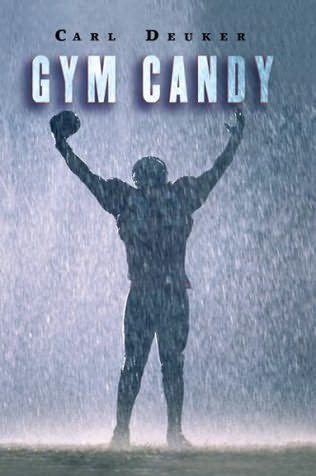
Alyson Noel is one of those authors I save for girly moments when I need a dose of fluff. Evermore does not disappoint. I actually really liked this story. It's kind of Wicked Lovely light but with the added sweetness of Ever's family. I especially love the little sister!

Slam cracked me up. I love Nick Hornby's writing. It's dry and irreverent and hilarious. I know this was his first crack at YA but I'm on the fence about whether or not to move it to the adult stacks. I think people who read his other novels would love this one but I'm not sure I could sell something like this to my teens. The whole time travel thing was especially odd. And the subject matter is very mature. There are other more teen-friendly books on teen pregnancy and fatherhood, such as The First Part Last. Either way, I liked it.
I love Patricia McCormick but Purple Heart wasn't my favorite. I liked the rehab and rehash quality of it but I think it would really lose the interest of teen readers. Like Sunrise Over Fallujah, this book deals with the murky nature of friend and foe in the midst of the Iraq war. But this one is more about the trauma and memory issues that come along with recovery rather than the actual events of the war.

My kids have been harassing me to read Gym Candy for months. I read it cover to cover on the plane and I have to say that I was pleasantly surprised. The ending completely shocked me, but I think it was a good, realistic cap to the story. I have to say that I skimmed most of the details about the football games because I have no understanding of the game, but it didn't hurt the story at all.

Alyson Noel is one of those authors I save for girly moments when I need a dose of fluff. Evermore does not disappoint. I actually really liked this story. It's kind of Wicked Lovely light but with the added sweetness of Ever's family. I especially love the little sister!

Tuesday, November 3, 2009
I've got plenty to be thankful for
Each month I write a monthly newsletter promoting books, programs, library resources, etc. This month my lead article was "books to be thankful for"- honoring the books in my life that I am thankful for because they have touched my life in some way, whether it changed the way I thought about something, or was a book that I needed to read at that particular time in my life. Here is my by no way complete list- what books are you thankful for?
Laurie Halse Anderson- Speak *ok, really anything by LHA falls onto this list
Jay Asher- 13 Reasons Why
Cherie Bennett & Jeff Gotesfeld- A Heart Divided
Ann Brashares- The Sisterhood of the Traveling Pants
Suzanne Collins- The Hunger Games
Kate Coombs- The Runaway Princess
Chris Crutcher- Whale Talk and Deadline
Nancy Garden- End Game
Pete Hautman- Invisible
S.E. Hinton- The Outsiders
James Howe- The Misfits
Angela Johnson- The First Part Last
David Lubar- Sleeping Freshmen Never Lie
Carolyn Mackler- The Earth, My Butt, and Other Big Round Things
L.M. Montgomery- Anne of Green Gables
Catherine Gilbert Murdock- Dairy Queen
Walter Dean Myers- Fallen Angels
Susan Beth Pffeffer- Life As We Knew It
J.K. Rowling- Harry Potter series
Carrie Ryan- The Forest of Hands and Teeth
Terry Trueman- Stuck in Neutral
Wendelin Van Draanen- Flipped
Carol Lynch Williams- The Chosen One
Laurie Halse Anderson- Speak *ok, really anything by LHA falls onto this list
Jay Asher- 13 Reasons Why
Cherie Bennett & Jeff Gotesfeld- A Heart Divided
Ann Brashares- The Sisterhood of the Traveling Pants
Suzanne Collins- The Hunger Games
Kate Coombs- The Runaway Princess
Chris Crutcher- Whale Talk and Deadline
Nancy Garden- End Game
Pete Hautman- Invisible
S.E. Hinton- The Outsiders
James Howe- The Misfits
Angela Johnson- The First Part Last
David Lubar- Sleeping Freshmen Never Lie
Carolyn Mackler- The Earth, My Butt, and Other Big Round Things
L.M. Montgomery- Anne of Green Gables
Catherine Gilbert Murdock- Dairy Queen
Walter Dean Myers- Fallen Angels
Susan Beth Pffeffer- Life As We Knew It
J.K. Rowling- Harry Potter series
Carrie Ryan- The Forest of Hands and Teeth
Terry Trueman- Stuck in Neutral
Wendelin Van Draanen- Flipped
Carol Lynch Williams- The Chosen One
Monday, November 2, 2009
Strange Angels

I just finished this one. I despise the cover, but it's a classic Buffy the Vampire Slayer type story with wonderfully graphic descriptions. I read an excerpt to a group of 8th graders and they were entranced.
Monday, October 26, 2009
Teen Read Week booktalks
Back at the Mass Library Association meeting in May, a school librarian came in and was talking about the art of the booktalk, and how if you want to get into classrooms you need to take no more than 10 minutes, and ideally you can get through 20 books in that time. And then she did so.
And because I'm me, my first thought was, "Pff. I can do that."
Well, it took more than a month of writing, editing, reading, trimming, rehearsing, and re-trimming, but I more or less did, and it is NOT as easy as she made it look. 20 books in the high school, 20 other books for the middle school. Presentations ran between 10 and 13 minutes, depending how much time I had to fill, and I did it 16 times.
I give you the benefit of my supposed expertise. The lists have been uploaded (high school and middle school). I recommend spreading the love around over the entire month, and not offering to do them all in one week, even if you think response from teachers will be poor. The teachers will surprise you, and 20 of them will want presentations. You might get lucky and have all the sixth-grade teachers bring their kids to an assembly at once, if you consider presenting an assembly for 300+ kids "lucky."
And most importantly, did it work? I had 5 kids sign out books on the spot at the high school, and had requests for 6 other books during the week. A response of 11 kids for the ~600 or so I spoke to isn't great, but we're talking teens, so I'm considering it phenomenal. And I am finding the booklists I passed around in the library, many of them with stars or other markings next to several titles. It's a beginning. Now I just need to get the other 590 kids to connect with a book...
And because I'm me, my first thought was, "Pff. I can do that."
Well, it took more than a month of writing, editing, reading, trimming, rehearsing, and re-trimming, but I more or less did, and it is NOT as easy as she made it look. 20 books in the high school, 20 other books for the middle school. Presentations ran between 10 and 13 minutes, depending how much time I had to fill, and I did it 16 times.
I give you the benefit of my supposed expertise. The lists have been uploaded (high school and middle school). I recommend spreading the love around over the entire month, and not offering to do them all in one week, even if you think response from teachers will be poor. The teachers will surprise you, and 20 of them will want presentations. You might get lucky and have all the sixth-grade teachers bring their kids to an assembly at once, if you consider presenting an assembly for 300+ kids "lucky."
And most importantly, did it work? I had 5 kids sign out books on the spot at the high school, and had requests for 6 other books during the week. A response of 11 kids for the ~600 or so I spoke to isn't great, but we're talking teens, so I'm considering it phenomenal. And I am finding the booklists I passed around in the library, many of them with stars or other markings next to several titles. It's a beginning. Now I just need to get the other 590 kids to connect with a book...
Monday, October 19, 2009
Teens Top 10
The Teens Top Ten books were announced today and I have to say, I'm slightly surprised. Kuedos to John Green for taking the top slot, but I have to admit that really shocked me, that and the presence of Frankie Landau Banks- which, quite frankly collects dust on my shelves. I'm glad to see a literary book win out over the paranormal stuff that has been dominating YA fiction (not that paranormal stuff isn't great, I read as much of it as my teens, but...). Nerdfighters are apparently a force to be reckoned with! What do you think of this year's choices? What are you surprised about not making the list?
1. Paper Towns by John Green (Penguin/Dutton)
2. Breaking Dawn by Stephenie Meyer (Little, Brown Books for Young Readers)
3. The Hunger Games by Suzanne Collins (Scholastic)
4. City of Ashes by Cassandra Clare (Simon & Schuster/Margaret K. McElderry)
5. Identical by Ellen Hopkins (Simon & Schuster/Margaret K. McElderry)
6. The Graveyard Book by Neil Gaiman (HarperCollins)
7. Wake by Lisa McMann (Simon & Schuster/Simon Pulse)
8. Untamed by P.C. and Kristin Cast (St. Martin's Griffin)
9. The Disreputable History of Frankie Landau-Banks by E. Lockhart (Disney-Hyperion)
10. Graceling by Kristin Cashore (Harcourt/Houghton Mifflin Harcourt)
1. Paper Towns by John Green (Penguin/Dutton)
2. Breaking Dawn by Stephenie Meyer (Little, Brown Books for Young Readers)
3. The Hunger Games by Suzanne Collins (Scholastic)
4. City of Ashes by Cassandra Clare (Simon & Schuster/Margaret K. McElderry)
5. Identical by Ellen Hopkins (Simon & Schuster/Margaret K. McElderry)
6. The Graveyard Book by Neil Gaiman (HarperCollins)
7. Wake by Lisa McMann (Simon & Schuster/Simon Pulse)
8. Untamed by P.C. and Kristin Cast (St. Martin's Griffin)
9. The Disreputable History of Frankie Landau-Banks by E. Lockhart (Disney-Hyperion)
10. Graceling by Kristin Cashore (Harcourt/Houghton Mifflin Harcourt)
Friday, September 25, 2009
Packaging woes

 To me, Lament: The Faerie Queen's Deception is the perfect example of how a cover can make or break a book. Stiefvater's dark, edgy, tale of the fey is the perfect story for any teen currently devouring Melissa Marr or Holly Black with its blend of evil faeries, celtic lore, and romance. Sadly, cover A happens to be the cover that has been collecting dust in my library- despite the popularity of Marr and Black. Cover B is what arrived on my doorstep from the publisher- much more visually appealing to me, but does little to convey the aspects of the story that will market it to fans of the urban fey subgenre (though both the knife and the clovers are important story elements). To add insult to injury, rather than include a synopsis on the cover, the publisher put one sentence and then relies on snipets of reviews from Booklist, Publishers Weekly, and KLIATT singing its praises. Which is sad, because this book is really good and has the potential to be another title that teens rave about, but will they discover it without my recommending it? I'm not sure.
To me, Lament: The Faerie Queen's Deception is the perfect example of how a cover can make or break a book. Stiefvater's dark, edgy, tale of the fey is the perfect story for any teen currently devouring Melissa Marr or Holly Black with its blend of evil faeries, celtic lore, and romance. Sadly, cover A happens to be the cover that has been collecting dust in my library- despite the popularity of Marr and Black. Cover B is what arrived on my doorstep from the publisher- much more visually appealing to me, but does little to convey the aspects of the story that will market it to fans of the urban fey subgenre (though both the knife and the clovers are important story elements). To add insult to injury, rather than include a synopsis on the cover, the publisher put one sentence and then relies on snipets of reviews from Booklist, Publishers Weekly, and KLIATT singing its praises. Which is sad, because this book is really good and has the potential to be another title that teens rave about, but will they discover it without my recommending it? I'm not sure.Wednesday, September 23, 2009
Every Soul a Star
 So this one is a little bit on the young side, but I adore it. It's pretty rare that an author can squeeze in that much science without getting dull or preachy. The three characters are wonderfully different and I think they'd appeal to kids with a wide range of experiences.
So this one is a little bit on the young side, but I adore it. It's pretty rare that an author can squeeze in that much science without getting dull or preachy. The three characters are wonderfully different and I think they'd appeal to kids with a wide range of experiences. Above all, the stories are not cheesy or contrived. They're very real with very real events.
I heart Wendy Mass.
Sunday, September 20, 2009
Love is the Higher Law
Just finished this tonight and I'm wondering how much of my reaction to the novel was in response to my own experiences that day and the vividness of my memories. Will teens connect with the story in that same meaningful fashion- especially since they were most likely under the age of 10 at the time. How much did they understand about what was happening to remember so clearly where they were and what they saw? I think they understand and appreciate the significance of that day, but teens are so "in the moment", does 9-11 hold the meaning for them that it does for us as adults?
Monday, September 14, 2009
Saturday, September 12, 2009
After the Moment
 I just finished this book and I have to say that I'm a bit disturbed. I know that the story was mostly written from the boy's perspective, but I'm having a hard time swallowing the fact that Maia just walked away from being raped... and is somehow healthier even though she refuses to acknowledge that it happened. How could someone with an eating disorder just walk away from something like that unscathed?!
I just finished this book and I have to say that I'm a bit disturbed. I know that the story was mostly written from the boy's perspective, but I'm having a hard time swallowing the fact that Maia just walked away from being raped... and is somehow healthier even though she refuses to acknowledge that it happened. How could someone with an eating disorder just walk away from something like that unscathed?! I didn't really buy into the romance in the first place... it seemed forced... but the arc of the story was just lacking. I really felt like it was missing some resolution.
I was disappointed.
Tuesday, September 8, 2009
Listening to an old favorite
 I temporarily ran out of audio books in my cue so I am revisiting an old favorite.
I temporarily ran out of audio books in my cue so I am revisiting an old favorite.Has anyone read/listened to this book? I LOVE it. It has to be one of the most romantic, sensual stories I've ever read. And the narrator reads it in this lovely satiny whispery voice that just makes it that much more intense.
I suspect that adults might enjoy it even more than teens since it's about young adult ghosts taking over the bodies of teenagers. I know it sounds weird... but it's amazing.
Ok, I'm done. Really I just wanted to fill the space. :)
Friday, August 28, 2009
Reviewing Thoughts
Yesterday, I came across John Green’s blog post about some of the perils of book reviewing: namely, that reviewers can put too much emphasis on their own reactions to a book (did they like it?), or that they can react negatively to a book based on a petty personal detail that doesn’t stand true for anyone else. I’m sure we’ve all been there, at least in our informal, personal reviews. I know I’ve posted any number of “it has a good beat; I can dance to it” style reviews on my GoodReads, but I try to remove “did I like it” from the equation before writing up an actual review that will be published in actual places. Sometimes I’m successful, sometimes… not so much.
Green references Shannon Hale’s blog post about rating books, and the reader’s responsibility in enjoying a book—how making a book speak to a reader is not entirely the task of the author; the reader needs to engage and be an active participant in the experience. Hale also asks “Do you find that the anticipation of reviewing the book has changed your reading experience?” And in some ways, it has for me—knowing that I have to pay more attention to plot development; that I can’t stop at “did I like it” to evaluate the book’s quality. There are plenty of books I didn’t like, but I still gave them middling to positive reviews, because I can understand a book’s appeal—even if it doesn’t appeal to me. (There are certain other books that I’ve found so dismal I honestly can’t understand the appeal to anyone—but there are plenty of other people who loved those books, so maybe I’m guilty of the “did I like this? No!” review, too.) But reviewing books both personally and professionally has changed the way I read and evaluate even the books I’m reading solely for myself, and I haven’t decided if that’s a good thing or not.
But what do you do when you’re anticipating one kind of book, and the book you’re reviewing turns out to be totally different? You could review it the way Entertainment Weekly’s book reviewer did, sticking to your delusions despite all the evidence to the contrary, and complain that Catching Fire sucked because lacked the erotic energy of Twilight. Or you could describe The Hunger Games as “the first in a projected young-adult trilogy about Katniss Everdeen, a heroic adolescent girl who crushed on a sexy hunter. In between romantic daydreams, Katniss shot strange beasts, dodged force fields, and battled murderous zombie werewolves — usually while wearing fabulous glitzy outfits.” Then be roundly mocked in the comments.
I’m not really aiming to make any large points here—mostly I’m just pointing out two excellent posts and the most misguided review I’ve read in some time. Discuss!
Green references Shannon Hale’s blog post about rating books, and the reader’s responsibility in enjoying a book—how making a book speak to a reader is not entirely the task of the author; the reader needs to engage and be an active participant in the experience. Hale also asks “Do you find that the anticipation of reviewing the book has changed your reading experience?” And in some ways, it has for me—knowing that I have to pay more attention to plot development; that I can’t stop at “did I like it” to evaluate the book’s quality. There are plenty of books I didn’t like, but I still gave them middling to positive reviews, because I can understand a book’s appeal—even if it doesn’t appeal to me. (There are certain other books that I’ve found so dismal I honestly can’t understand the appeal to anyone—but there are plenty of other people who loved those books, so maybe I’m guilty of the “did I like this? No!” review, too.) But reviewing books both personally and professionally has changed the way I read and evaluate even the books I’m reading solely for myself, and I haven’t decided if that’s a good thing or not.
But what do you do when you’re anticipating one kind of book, and the book you’re reviewing turns out to be totally different? You could review it the way Entertainment Weekly’s book reviewer did, sticking to your delusions despite all the evidence to the contrary, and complain that Catching Fire sucked because lacked the erotic energy of Twilight. Or you could describe The Hunger Games as “the first in a projected young-adult trilogy about Katniss Everdeen, a heroic adolescent girl who crushed on a sexy hunter. In between romantic daydreams, Katniss shot strange beasts, dodged force fields, and battled murderous zombie werewolves — usually while wearing fabulous glitzy outfits.” Then be roundly mocked in the comments.
I’m not really aiming to make any large points here—mostly I’m just pointing out two excellent posts and the most misguided review I’ve read in some time. Discuss!
Sunday, August 23, 2009
Have You Read This One Yet?
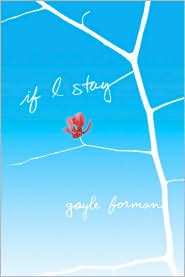
I read this one awhile ago and am just getting around to writing my review of it now. I was kind of hestitant to read it- I mean hello, talk about DEPRESSING- but it has been one of those books that has stayed with me. But be warned, you'll want to keep that box of tissues near by- just thinking about the story brings tears to my eyes. Forman's writing is simple and beautiful and her descriptions evoke multiple senses at once. It is haunting- in the best sense of the word.
Saturday, August 22, 2009
North of Beautiful by Justina Chen Headley
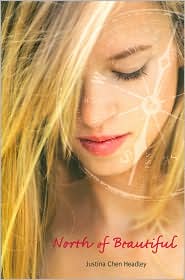 I've been reading this one for a couple of weeks- it is a slow read, but I found it to be a beautiful coming of age story. Full of layers and symbolism, Headley does a masterful job weaving cartography into the novel. There is a scene between Terra and a young girl in a Chinese orphanage that is so moving. I saw a lot of my teenage-self in Terra. Justina Chen Headley is someone to keep on your radar.
I've been reading this one for a couple of weeks- it is a slow read, but I found it to be a beautiful coming of age story. Full of layers and symbolism, Headley does a masterful job weaving cartography into the novel. There is a scene between Terra and a young girl in a Chinese orphanage that is so moving. I saw a lot of my teenage-self in Terra. Justina Chen Headley is someone to keep on your radar.
Tuesday, August 11, 2009
Be sure to check out...
Eon: Dragoneye Reborn
Don't let its 540+ pages make you shy away- this book is a treat from start to finish- whether you are a dragon lover or not.
Don't let its 540+ pages make you shy away- this book is a treat from start to finish- whether you are a dragon lover or not.
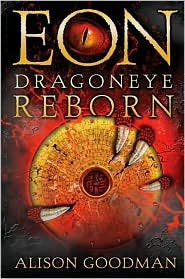
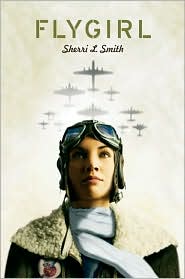
Flygirl by Sherri L. Smith
Not crazy about the cover, but this historical fiction has great writing and a likeable narrator and is the perfect book to pass to fans of the genre.
Sunday, July 19, 2009
Because I am Furniture by Thalia Chaltas
I was really impressed by this title. I'm not normally a book in verse fan, but I found this title gripping. Anke's struggles with her desire for attention that she does not receive from her abusive father is presented in a heart-wrenching and compelling narrative. It's not perfect- there were a few plot elements that were dropped without resolution, but it will definitely appeal to fans of Ellen Hopkins and Sonya Sones.
Thursday, July 16, 2009
summer reading
Quick list of my summer reads:
The Book Thief by Mark Zusak. I know I am way late to this party, but in case anyone else is in my position of just-hadn't-gotten-around-to-it-yet, may I say GO! Read it Now!!! It is one of the best books I have read, and the book I am giving to people like my Dad and my high school English teacher as a pinnacle of great YA writing. The charcters are so well drawn, it is just abstract enough in its narration to be sophisticated without daunting teen readers. I loved it.
The Juvie Three by Gordon Korman. Lately there has been an increase in my library of teens asking for books about crime, street life, jail, drug dealing, etc. which is the main reason I read this book. I was hoping it would be a good one to reccommend. I am not sure how I feel about it. The basic premis is that 3 kids living in a halfway house find themselves living as model citizens, even against their will, because their group leader sustained a devestating head injury and they know that if they make any mistakes, their situation will be uncovered and they will all be sent back to lock-up. The author tries really hard to acknowledge and address how improbable it seems that they are able to pull of the deception, but this wasn't enough for me to not find it distractingly far-fetched. But I think if you are a teen reluctant reader that might not bother you and the story would be action-packed enough to pull you along.
Kieron Smith, Boy by James Kellman. So this is actually an adult book, winner of Scottish Book of the Year, and I know I have a more vested interest in it than most because I went to school in Scotland and wrote a thesis about the role of slang in adolescent male novels, and this book fits right in with those two interests as the narrative of a young boy coming of age in industrial Glasgow. The author does a pretty amazing job of seeing the world through a young boy's eyes, leaving unexplained things that he can't make sense of, depicting the casual brutality of older brothers, introducing family tensions that you only half-observe at that age. I find it most interesting for how violence is taken in stride and even celebrated as an unavoidable occurence, and for this reason I think the book is worth mentioning to anyone who works with young men and has never been one herself.
Most of my newest titles are out now, which is part of the reason I am catching up on some past reads and adult books!
The Book Thief by Mark Zusak. I know I am way late to this party, but in case anyone else is in my position of just-hadn't-gotten-around-to-it-yet, may I say GO! Read it Now!!! It is one of the best books I have read, and the book I am giving to people like my Dad and my high school English teacher as a pinnacle of great YA writing. The charcters are so well drawn, it is just abstract enough in its narration to be sophisticated without daunting teen readers. I loved it.
The Juvie Three by Gordon Korman. Lately there has been an increase in my library of teens asking for books about crime, street life, jail, drug dealing, etc. which is the main reason I read this book. I was hoping it would be a good one to reccommend. I am not sure how I feel about it. The basic premis is that 3 kids living in a halfway house find themselves living as model citizens, even against their will, because their group leader sustained a devestating head injury and they know that if they make any mistakes, their situation will be uncovered and they will all be sent back to lock-up. The author tries really hard to acknowledge and address how improbable it seems that they are able to pull of the deception, but this wasn't enough for me to not find it distractingly far-fetched. But I think if you are a teen reluctant reader that might not bother you and the story would be action-packed enough to pull you along.
Kieron Smith, Boy by James Kellman. So this is actually an adult book, winner of Scottish Book of the Year, and I know I have a more vested interest in it than most because I went to school in Scotland and wrote a thesis about the role of slang in adolescent male novels, and this book fits right in with those two interests as the narrative of a young boy coming of age in industrial Glasgow. The author does a pretty amazing job of seeing the world through a young boy's eyes, leaving unexplained things that he can't make sense of, depicting the casual brutality of older brothers, introducing family tensions that you only half-observe at that age. I find it most interesting for how violence is taken in stride and even celebrated as an unavoidable occurence, and for this reason I think the book is worth mentioning to anyone who works with young men and has never been one herself.
Most of my newest titles are out now, which is part of the reason I am catching up on some past reads and adult books!
Monday, July 13, 2009
Shattering Glass
 So as Alissa reads all the new ones, I'm digging through the archives of YA lit. :)
So as Alissa reads all the new ones, I'm digging through the archives of YA lit. :)I just finished this book and I have to say, it surprised me. It really reminded me of the Chocolate War in its naked brutality. I kept thinking, she won't go there... but she did.
Wow.
Has anyone else read this one?
Sunday, July 5, 2009
So many books, so little time
So, I spent this lovely 3-day weekend curled up inside reading frantically trying to get all of the BBYA nominations read before dicussions begin at ALA this coming weekend. Lost cause, probably... BUT, I did get a lot read and here are my quick thoughts on them.
Julia Alvarez- Return to Sender

Good story around contemporary issue but really too young for YA
Ellen Jensen Abbott- Watersmeet
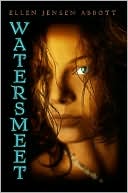
Did not expect to like this one as much as I did. Not perfect, but a solid quest fantasy/coming of age.
Kekla Magoon- The Rock and The River

Solid historical fiction featuring the Black Panthers which are not often seen in Children's fiction.
Julia Hoban- Willow

Hauntingly realistic- not quite as elegant as Laurie Halse Anderson but would be a good recommendation for fans of hers or Sarah Dessen.
Jacqueline Davies- Lost
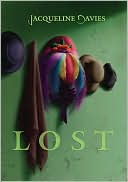
This books biggest problem is its cover. I was surprised by how much I enjoyed it.
Donna Jo Napoli- Alligator Bayou
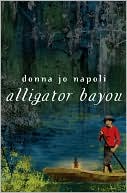
Not what I expected from her but it is a very touching historical fiction story with a horrible horrible ending.
Peter Marino- Magic and Misery
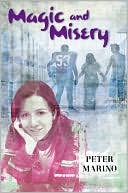
Nothing spectacular about it- but I really enjoyed it nonetheless. I found the characters voices to be authentic and interesting. Light-hearted and upbeat while tacking serious issues.
Michael Northrup- Gentlemen
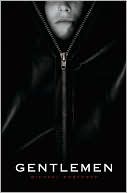
I am still puzzled by this book- not quite sure how I feel about it yet.
Phillip Hoose- Claudette Colvin: Twice Toward Justice
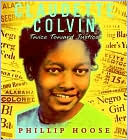
Interesting and readable story of a teenager whose contributions to the Civil Rights Movement are not well known, but meaningful. Is it something teens will pick up on their own, no- but would be great for use in classrooms and for assignments.
Julia Alvarez- Return to Sender

Good story around contemporary issue but really too young for YA
Ellen Jensen Abbott- Watersmeet

Did not expect to like this one as much as I did. Not perfect, but a solid quest fantasy/coming of age.
Kekla Magoon- The Rock and The River

Solid historical fiction featuring the Black Panthers which are not often seen in Children's fiction.
Julia Hoban- Willow

Hauntingly realistic- not quite as elegant as Laurie Halse Anderson but would be a good recommendation for fans of hers or Sarah Dessen.
Jacqueline Davies- Lost

This books biggest problem is its cover. I was surprised by how much I enjoyed it.
Donna Jo Napoli- Alligator Bayou

Not what I expected from her but it is a very touching historical fiction story with a horrible horrible ending.
Peter Marino- Magic and Misery

Nothing spectacular about it- but I really enjoyed it nonetheless. I found the characters voices to be authentic and interesting. Light-hearted and upbeat while tacking serious issues.
Michael Northrup- Gentlemen

I am still puzzled by this book- not quite sure how I feel about it yet.
Phillip Hoose- Claudette Colvin: Twice Toward Justice

Interesting and readable story of a teenager whose contributions to the Civil Rights Movement are not well known, but meaningful. Is it something teens will pick up on their own, no- but would be great for use in classrooms and for assignments.
Monday, June 22, 2009
Libraries Are the New Black?
Has anyone else noticed how frequently libraries and librarians are appearing in recent teen fiction? The Chosen One (Carol Lynch Williams) features a bookmobile as a catalyst for Kyra's questions of an escape from the world she lives in. Much of Lisa McMann's Wake takes place in the school library, where Janie tries to take brief naps between classes. Alexis, the protagonist of Katie Alender's Bad Girls Don't Die, uses the microfiche and special collections of her local library (with the rule-bending librarian’s assistance) to research methods of exorcising her sister.
There are plenty more--I've been noticing it more often lately, and that's my question. Is this something that I'm noticing more because I'm more aware of it, or is it popping up more often? Are libraries and librarians included because they’re organic to the plot (they don’t always feel that way), or are the authors sort of pandering to the library market, making a self-conscious nudge to the readers of "hey, use your library"?
And even if that last is what they're doing: does that matter? Is it enough that authors are, however obviously, normalizing the use of libraries—establishing that libraries and librarians can answer just about any question, from "is there a world outside my sheltered existence?" to "how do I help my demon-possessed sibling?"
There are plenty more--I've been noticing it more often lately, and that's my question. Is this something that I'm noticing more because I'm more aware of it, or is it popping up more often? Are libraries and librarians included because they’re organic to the plot (they don’t always feel that way), or are the authors sort of pandering to the library market, making a self-conscious nudge to the readers of "hey, use your library"?
And even if that last is what they're doing: does that matter? Is it enough that authors are, however obviously, normalizing the use of libraries—establishing that libraries and librarians can answer just about any question, from "is there a world outside my sheltered existence?" to "how do I help my demon-possessed sibling?"
Sunday, June 14, 2009
Bad Cover- Good Book

Horrible Cover.
Interesting, well-written, and relative book.
A lot of interesting discussions could be held on this book but will teens read it?
This is definitely a candidate for my "don't judge a book by it's cover" display.
Thursday, June 11, 2009
Burn Journals
 I just finished this book and I loved it. I've been looking for hopeful, uplifting books and I think this one is great. I love the focus on recovery and healing.
I just finished this book and I loved it. I've been looking for hopeful, uplifting books and I think this one is great. I love the focus on recovery and healing.
Thursday, June 4, 2009
The Spectacular Now
So I am halfway through The Spectacular Now and enjoying it greatly. Witty first-person narration, realistic characters, real issues presented cleverly. However, I think it has a pretty un-Spectacular cover. How do others feel? In my opion, the graphics don't really relate to the story at all, and on their own don't do much to grab my attention or motivate me to pick it up. As an adult, I kind of appreciate the vague 1960s nostalgic feel it has, but I think a teen would totally miss that and again, it is set in the present so the images don't really jive for me. How has the story and its cover been received by your teens? I plan to pitch it hard to any likely parties, but would it circulate on its own?
Saturday, May 23, 2009
YA Life immitating Art
So has anyone read Wintergirls yet, by Laurie Halse Anderson? I read it as soon as I could get my hands on a copy, and thought that it was beautifully written, completely sucked me into the story, the voice, the well-rounded characters... Yet when I was done reading it, for the first time in maybe ever, I felt hestitation about reccomending it to teens. Something about the powerful first-person narrative of a young anorexic girl who is so singlemindedly focused on her weight and food made me fear that this book could be dangerous. I couldn't even articulate why, exactly. Then in the past weeks articles have begun appearing addressing the issue of this book as a "trigger" for teens who may potentially suffer from anorexia, and a lot of my partially-formed qualms were addressed. In particular this from the New York Times http://www.nytimes.com/2009/05/10/books/review/Feinberg-t.html I found helpful in speaking to me about how I felt about this compelling book, even just because it was nice to know others had had similar reactions. And by "others" I mean people who, like myself, are not in the position of censoring books or information but rather making it as available as possible. Why had I felt tentative about placing this book in teens' hands? As I reflected on the book itself, and the articles I had read, I also started to wonder about the influence all teen literature has on its readers, and asking myself what YA literaure isn't a trigger of some sort? I remember in my tween years beginning to read The Babysitter's Club series; suddenly my mother noticed that I was starting to have a lot more attitude. I may have forgotten about this completely had not a patron's mother recently voiced the same concern about her daughter (in fact, she used the exact same word to describe her daughter's recent behaviour as my mom had mine: snotty).
One of the reasons I love young adult literature so much and find it so vital for adolescent development is that it presents readers with scenarios that help them to make difficult decisions. It gives them a set of life experiences, even if they are varied, fantastical, and fictional, that adults usually have accumulated through learning the hard way. The same way we hope that books will trigger confidence, tolerance, self-respect, or any of the other attributes teen literature positively instills, can I wonder why I feared the power of a book as well written as Anderson's Wintergirls to trigger dangerous behaviour? I must of course stress that I understand the substantial difference between a psychological trigger impacting a disease like anorexia and the influence or "trigger" of a book that speaks to other, perhaps more universal, teen development.
One of the greatest arguments for Wintergirls' power is that it speaks honestly to consequences, doesn't glorify the disease, and concludes with Lia seeking help of her own accord.
I'm anxious to hear from others who have read this book, or any books they may have felt similarly about. Have you ever noticed a direct relation between what a teen is reading and a sudden shift in behavior? Have you ever recognized this in yourself as a reader? And is there ever a justification for wanting to withold powerful and influential works from impressionable minds both young and old?
Tuesday, May 12, 2009
Serial Drama
A smattering of lines from some recent teen book reviews:
“And I'd further bet that the things that don't appear in this book will appear in others in the series.”
(From Tea Cozy's review of Prophecy of The Sisters)
“Ryan’s tale is certain to be popular with teen readers who will anxiously await a sequel.”
(From Alissa's review of The Forest of Hands and Teeth)
“and the ending of the novel is abrupt, begging for a sequel, instead of being a completely satisfying, self-contained whole on its own.”
(From The YaYaYas' review of Silver Phoenix)
“It ends almost as abruptly as The Fellowship of the Ring, with Todd and Viola standing on the precipice ofa sequel some serious evil.”
(From Librarilly Blonde's review of The Knife of Never Letting Go)
I could go on in this vein for a while. (In fact, I deleted another 4 or 5 similar references already.) The number of recently-published books that have sequels attached, or plans for sequels, is overwhelming. Don’t get me wrong—when it’s a good book, I’m perfectly happy to go back and revisit that world. (Though, to be fair, I’m the kind of reader who has to exert serious effort to not read sequels to books I didn’t like.) I’m not anti-serial: I’m looking forward to Catching Fire, despite my complaint that The Hunger Games was a fantastic stand-alone, and there are plenty of books that I don’t think could work any other way than as a series (Harry Potter, Lord of the Rings, even Earthsea—anywhere there’s too much story to cram into one book). But there are plenty of books that have sequels, or sometimes just “companion books,” that don’t really need them. For instance, the otherwise-enjoyable 100 Cupboards (N.D. Wilson) contains a poorly-integrated afterthought of an epilogue that reintroduces our vanquished villain for Book 2, and Laurie Halse Anderson’s Chains was barely even published before word was out about Forge.
Maybe it’s a marketing decision (an established product is more likely to sell), or maybe it’s a laziness thing on the authors’ parts (surely it’s easier to revisit an established world than to invent a whole new one). Maybe it’s publishers’ reactions to the idea that Teens Don’t Read Anymore (I disagree, but that’s another post), so if we can hook them on one book maybe we’ll convince them to read three or four in the exact same vein. Maybe it’s due to the popularity of manga and its 40+-volume serials, and publishers of prose novels are assuming sequels are the way to keep up. Maybe it’s a simple resistance to change, the safe cocoon of characters and world settings with which we’re already familiar. I don’t know—I’m throwing darts at a map, but I don’t believe it’s entirely any one of these things. It does make me wonder, though: when did we get so reliant on having every conclusion spelled out for us? What’s so wrong with ambiguity, that we can’t have an open-ended book without immediately clamoring for a sequel?
“And I'd further bet that the things that don't appear in this book will appear in others in the series.”
(From Tea Cozy's review of Prophecy of The Sisters)
“Ryan’s tale is certain to be popular with teen readers who will anxiously await a sequel.”
(From Alissa's review of The Forest of Hands and Teeth)
“and the ending of the novel is abrupt, begging for a sequel, instead of being a completely satisfying, self-contained whole on its own.”
(From The YaYaYas' review of Silver Phoenix)
“It ends almost as abruptly as The Fellowship of the Ring, with Todd and Viola standing on the precipice of
(From Librarilly Blonde's review of The Knife of Never Letting Go)
I could go on in this vein for a while. (In fact, I deleted another 4 or 5 similar references already.) The number of recently-published books that have sequels attached, or plans for sequels, is overwhelming. Don’t get me wrong—when it’s a good book, I’m perfectly happy to go back and revisit that world. (Though, to be fair, I’m the kind of reader who has to exert serious effort to not read sequels to books I didn’t like.) I’m not anti-serial: I’m looking forward to Catching Fire, despite my complaint that The Hunger Games was a fantastic stand-alone, and there are plenty of books that I don’t think could work any other way than as a series (Harry Potter, Lord of the Rings, even Earthsea—anywhere there’s too much story to cram into one book). But there are plenty of books that have sequels, or sometimes just “companion books,” that don’t really need them. For instance, the otherwise-enjoyable 100 Cupboards (N.D. Wilson) contains a poorly-integrated afterthought of an epilogue that reintroduces our vanquished villain for Book 2, and Laurie Halse Anderson’s Chains was barely even published before word was out about Forge.
Maybe it’s a marketing decision (an established product is more likely to sell), or maybe it’s a laziness thing on the authors’ parts (surely it’s easier to revisit an established world than to invent a whole new one). Maybe it’s publishers’ reactions to the idea that Teens Don’t Read Anymore (I disagree, but that’s another post), so if we can hook them on one book maybe we’ll convince them to read three or four in the exact same vein. Maybe it’s due to the popularity of manga and its 40+-volume serials, and publishers of prose novels are assuming sequels are the way to keep up. Maybe it’s a simple resistance to change, the safe cocoon of characters and world settings with which we’re already familiar. I don’t know—I’m throwing darts at a map, but I don’t believe it’s entirely any one of these things. It does make me wonder, though: when did we get so reliant on having every conclusion spelled out for us? What’s so wrong with ambiguity, that we can’t have an open-ended book without immediately clamoring for a sequel?
If you want to feel bleak and hopeless, read this
Living Dead Girl by Scott
A Long Way Gone by Beah
Lessons from a Dead Girl by Knowles
Before I Die by Downham
Tears of a Tiger by Draper
Thirteen Reasons Why by Asher
this list seems so much easier to write...
A Long Way Gone by Beah
Lessons from a Dead Girl by Knowles
Before I Die by Downham
Tears of a Tiger by Draper
Thirteen Reasons Why by Asher
this list seems so much easier to write...
Monday, May 11, 2009
Alcatraz VS the Evil Librarians by Brandon Sanderson
I just finished reading Alcatraz vs the Evil Librarians by Brandon Sanderson which is about a boy named Alcatraz who received a bag of sand for his 13th birthday. I know what you are thinking...best present ever right? To the evil librarians who rule the Husland, they could take over the world with this bag of sand. With the help of his long-lost grandfather, Alcatraz must retreieve the bag of sand before it's too late. I loved the style of this book. The author actually directly addresses the reader throughout the story to provide humor and play with writing techniques. It helps develop an attachment to Alcatraz by learning along with him about the Huslands. This book has an array of memorable characters too. I enjoyed the stereotypes of the shushing bun in hair librarian and the romance paperback monsters. The themes of the "power of information" still ring true in today's headlines. Do we give too much information away? Is information censored? What about what's in the news?
Thursday, May 7, 2009
Happy Teen Books?
I have a new goal... i want to put together a list of happy (even funny!) teen books for summer reading. This all started because I'm reading A Long Way Gone and I just can't handle anymore death and destruction. So I tried to find a good happy book for my book club and it took serious effort!!!
So let's make a list. I'd like to gear it to 7th-9th grade specifically, but older is ok too. This is what I have so far:
My Most Excellent Year by Kluger
Lemonade Mouth by Hughes
Skullduggery Pleasant by Landy
Bloody Jack by Meyer
help?
So let's make a list. I'd like to gear it to 7th-9th grade specifically, but older is ok too. This is what I have so far:
My Most Excellent Year by Kluger
Lemonade Mouth by Hughes
Skullduggery Pleasant by Landy
Bloody Jack by Meyer
help?
Fate & Luna

I just saw this book cover on Amazon... is it just me or is it suspiciously similar to the paperback cover of Luna?

I find this a little odd.
Wednesday, May 6, 2009
High School summer reading
So I'm on the committee for high school summer reading. We've come up with 3 options for the *entire* high school to read this summer.
Sunrise Over Fallujah by Myers (my first choice)
A Long Way Gone by Beah (I'm reading it and am not sure yet...)
All Souls by MacDonald (I don't even think I want to try this one...)
Thoughts?
Sunrise Over Fallujah by Myers (my first choice)
A Long Way Gone by Beah (I'm reading it and am not sure yet...)
All Souls by MacDonald (I don't even think I want to try this one...)
Thoughts?
Tuesday, April 28, 2009
What is up with non-fiction?
So I've been reading quite a bit of non-fiction lately and I'm starting to become a little concerned. Not by the quality because I've read some pretty well-written, thoroughly researched, and engaging non-fiction but what's up with citations? All of these books are using source notes instead of in-text citations or footnotes. This worries me- particulary when it comes to teens using these books for their own research projects and papers. After all, how can we expect teens to learn how to properly cite sources if the books they are citing do not use a method that makes the types of material that require citations easily recognizable to students? After all, how many of them are going to check the source notes after every page to see what is cited- especially when there is no indication within the text that it is cited anywhere? I realize that source notes are acceptible (and generally prefered) in academic research, but I think that these authors and publishers need to recognize their audience and remember that as they are determining how they will handle citations.
Monday, April 27, 2009
Sloppy Firsts and series
Where do you all shelve the 4th book of McCafferty's series? I have it in the adult section while the first 3 (Sloppy Firsts, Second Helpings, Charmed Thirds) are in YA. I did this when I first started here after looking to see where other librarians had shelved them.
I wonder, though, about series like these. I know the main character gets older and therefore gets into more mature stuff in the 4th books. The same could be said for the last Sisterhood of the Traveling Pants books... and Breaking Dawn as well. These kids grow up! So, do we expect readers to follow the characters out of the YA section and into the adult stacks?
I know the same debate started happening with Harry Potter and the 7th book.
But isn't the whole idea that kids grow up and get into more mature situations? I mean, not all characters can be like Nancy Drew and remain the same age forever, right?
I wonder, though, about series like these. I know the main character gets older and therefore gets into more mature stuff in the 4th books. The same could be said for the last Sisterhood of the Traveling Pants books... and Breaking Dawn as well. These kids grow up! So, do we expect readers to follow the characters out of the YA section and into the adult stacks?
I know the same debate started happening with Harry Potter and the 7th book.
But isn't the whole idea that kids grow up and get into more mature situations? I mean, not all characters can be like Nancy Drew and remain the same age forever, right?
Thursday, April 23, 2009
Hunger Games vs Battle Royale
When The Hunger Games came out, we all eagerly tore through it, turning pages late into the night because we just couldn’t put this book down. We told our friends about it, our coworkers, any teen who came into the library. And somewhere along the way, as we were breathlessly raving about this amazing, exciting book, someone interrupted us with a question:
“Isn’t that the same story as Battle Royale?”
Most of us probably cocked our heads to one side and stared dumbly, confused, at the questioner. Battle Royale? Well, it’s hard to say, since we hadn’t seen it or read it. Then the internet picked up the story: “Suzanne Collins totally ripped off Battle Royale!” I was curious, but dubious. I had to take one for the team and find out.
Battle Royale is the story of a class of 40 Japanese high school students whose bus gets detoured on a field trip. The students wake up in an unfamiliar classroom and are informed that their class has been randomly chosen for that year’s program, which means they must now kill each other until only one student remains. Each student is given a backpack containing food, water, and a weapon of varying quality (from machine guns to forks) and released. Alliances are made, then broken; friends are betrayed and killed, sometimes intentionally.
The basic plot is similar to The Hunger Games, but there are some other similarities that grated, as well—there are two instances in Battle Royale in which a character is severely wounded and is nursed through the injury by their crush. There are regular announcements of which students have been killed in the last six hours. Even the black backpacks of supplies seemed a strong match, though I was willing to view this as a coincidence.
By the midway point, though, the two books part company. By the end, it's not the same story at all. It's a similar story, definitely, but Battle Royale's strength is that most of the 40 characters manage to be sympathetic characters. We get back story on just about all of them, find out who they were before they were thrown into this crazy game, what motivates them to do certain things, and we even see their individual battles against each other. There are a couple of factions we return to multiple times, the ones who are clearly our heroes, but with only one or two exceptions we don't have villains. In The Hunger Games, nearly everyone who wasn't from District 12 was a villain, someone to be avoided and distrusted, and that was easy because we didn't know who those other characters were. The emotional punch that each player’s death packed for the reader was tempered by our lack of connection to those characters. In Battle Royale, on the other hand, we get to know all these characters--they're classmates, some dating back to elementary school. There are histories here, friendships and crushes and romantic entanglements, and that investment in who each student is makes the killing that much more horrible.
Plot and characters aside, there are two other major differences between these books. The first is the writing: while both books are nearly impossible to put down, the writing in The Hunger Games is vastly superior. Battle Royale has the occasional fantastic sentence but is written with a lot of “basically” and “of course” and “in other words;” whether this a failing of the author or translator is anyone’s guess. The other major difference is the level of violence. Sure, we saw some unsavory things in The Hunger Games, but it’s got nothing on Battle Royale. The gunfights were bad enough, but the graphic descriptions of hand-to-hand combat were particularly brutal. It's not the violence that's gratuitous, exactly, but the lengthy descriptions of it, and even that goes a long way toward world-building and accurately conveying the horror of the situation.
In an interview, Collins said she based her story on the myth of Theseus and the Minotaur—the idea of sending seven boys and seven girls to be killed every ninth year led her to the annual Hunger Games competition. I’m willing to believe that’s true, at least in part, but I do still harbor a suspicion that somewhere along the way she saw Battle Royale. She may have forgotten about it, and almost certainly didn’t draw on it consciously (I wouldn’t go so far as to call plagiarism), but the similarities seem a little too similar. Maybe both books are based on Theseus and the Minotaur and the similarities are just coincidence. Either way, I’m looking forward to Catching Fire, the second book of The Hunger Games, to see some fresh material from Collins—and to find out what’s in store for Katniss.
“Isn’t that the same story as Battle Royale?”
Most of us probably cocked our heads to one side and stared dumbly, confused, at the questioner. Battle Royale? Well, it’s hard to say, since we hadn’t seen it or read it. Then the internet picked up the story: “Suzanne Collins totally ripped off Battle Royale!” I was curious, but dubious. I had to take one for the team and find out.
Battle Royale is the story of a class of 40 Japanese high school students whose bus gets detoured on a field trip. The students wake up in an unfamiliar classroom and are informed that their class has been randomly chosen for that year’s program, which means they must now kill each other until only one student remains. Each student is given a backpack containing food, water, and a weapon of varying quality (from machine guns to forks) and released. Alliances are made, then broken; friends are betrayed and killed, sometimes intentionally.
The basic plot is similar to The Hunger Games, but there are some other similarities that grated, as well—there are two instances in Battle Royale in which a character is severely wounded and is nursed through the injury by their crush. There are regular announcements of which students have been killed in the last six hours. Even the black backpacks of supplies seemed a strong match, though I was willing to view this as a coincidence.
By the midway point, though, the two books part company. By the end, it's not the same story at all. It's a similar story, definitely, but Battle Royale's strength is that most of the 40 characters manage to be sympathetic characters. We get back story on just about all of them, find out who they were before they were thrown into this crazy game, what motivates them to do certain things, and we even see their individual battles against each other. There are a couple of factions we return to multiple times, the ones who are clearly our heroes, but with only one or two exceptions we don't have villains. In The Hunger Games, nearly everyone who wasn't from District 12 was a villain, someone to be avoided and distrusted, and that was easy because we didn't know who those other characters were. The emotional punch that each player’s death packed for the reader was tempered by our lack of connection to those characters. In Battle Royale, on the other hand, we get to know all these characters--they're classmates, some dating back to elementary school. There are histories here, friendships and crushes and romantic entanglements, and that investment in who each student is makes the killing that much more horrible.
Plot and characters aside, there are two other major differences between these books. The first is the writing: while both books are nearly impossible to put down, the writing in The Hunger Games is vastly superior. Battle Royale has the occasional fantastic sentence but is written with a lot of “basically” and “of course” and “in other words;” whether this a failing of the author or translator is anyone’s guess. The other major difference is the level of violence. Sure, we saw some unsavory things in The Hunger Games, but it’s got nothing on Battle Royale. The gunfights were bad enough, but the graphic descriptions of hand-to-hand combat were particularly brutal. It's not the violence that's gratuitous, exactly, but the lengthy descriptions of it, and even that goes a long way toward world-building and accurately conveying the horror of the situation.
In an interview, Collins said she based her story on the myth of Theseus and the Minotaur—the idea of sending seven boys and seven girls to be killed every ninth year led her to the annual Hunger Games competition. I’m willing to believe that’s true, at least in part, but I do still harbor a suspicion that somewhere along the way she saw Battle Royale. She may have forgotten about it, and almost certainly didn’t draw on it consciously (I wouldn’t go so far as to call plagiarism), but the similarities seem a little too similar. Maybe both books are based on Theseus and the Minotaur and the similarities are just coincidence. Either way, I’m looking forward to Catching Fire, the second book of The Hunger Games, to see some fresh material from Collins—and to find out what’s in store for Katniss.
Wednesday, April 22, 2009
Just can't stop thinking about it
Wintergirls... I'm not sure there are any words that effectively describe the physical and emotional response I had while reading this. The story is painful and horrible to read... but you just.. can't... stop.
Laurie Halse Anderson never fails to disappoint- I think her writing is only getting better. If you haven't read it yet, I recommend moving it to the top of the must read pile.
3 cups of what?
So I'm on the committee to choose the High School summer reading book -- yes one book for the entire high school.
The high school librarian came up with a list of suggestions and one of them was Three Cups of Tea. I tried, really I did. I just couldn't do it. Should I slog on or give up? Please can I give up??
I'm taking much more interesting choices to the meeting -- Sunrise over Fallujah is my first choice at the moment.
The high school librarian came up with a list of suggestions and one of them was Three Cups of Tea. I tried, really I did. I just couldn't do it. Should I slog on or give up? Please can I give up??
I'm taking much more interesting choices to the meeting -- Sunrise over Fallujah is my first choice at the moment.
Welcome!
Since it's been hard to get people together, I'm taking my and Alissa's idea digital!
Let's share our thoughts on the teen books we read... recommend good ones, slam the bad. No one has time to read them all (right Alissa?) so we might as well help each other out.
This is an open blog so please pass it along and I can make people authors as they join.
:)
Sharon
Let's share our thoughts on the teen books we read... recommend good ones, slam the bad. No one has time to read them all (right Alissa?) so we might as well help each other out.
This is an open blog so please pass it along and I can make people authors as they join.
:)
Sharon
Subscribe to:
Comments (Atom)

